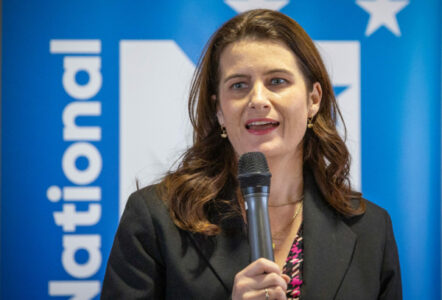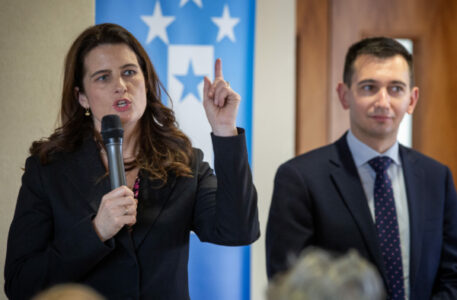
National Party deputy leader Nicola Willis has delivered her party’s election pitch to several hundred residents at an east Auckland retirement complex.
Willis, who is also the party’s finance spokesperson, recently visited Pakuranga Park Village with Pakuranga MP Simeon Brown.
She praised Brown’s work in the electorate and told the audience he’s “extremely well respected in Wellington”.
“For such a young man he has one of the wisest heads in our caucus.
“He is a very good thinker about this country and its future and the policies we need.
“We need that right now, good thinking, because I think many of you will agree with me the country is in a bad way.”
Willis detailed New Zealand’s challenges and how National would address them should it be elected to Government at this year’s general election on October 14.
She said the cost of living crisis has “dragged on to its third year”, with high inflation meaning prices have been rising faster that people’s incomes.
“I worry about those homeowners who have got big mortgages. They had to take on a big mortgage to get into this elevated housing market.
“They took on a loan with an interest rate of two or three per cent.
“Now that interest rate is six or seven per cent and they have to spend hundreds more as a family just to pay their mortgage.”
Willis said businesses are struggling due to the recession.
New Zealand’s “really significant” current account deficit shows the country is spending more in the world than it’s earning and its net debt has grown from $5.6 billion in 2019 to $73b now.
Kiwis need to ask what they have to show for the large debt accumulated by Finance Minister Grant Robertson, she said.
“I think we’d have a bit more forgiveness for Mr Robertson and his friends if we could point to wonderful new motorways, reduced waiting times for surgery, and greater achievement in our schools.
“But we’re not seeing those things. Instead, what we’re seeing is potholes on roads, speed signs telling people to go slower, surging violent crime, lower achievement in schools, and people having to wait longer not only to get an operation but just to see a specialist.”

Willis said National’s plan is to get the Government’s books back in order and drive more value for the money it spends.
It’ll set targets for what it wants to achieve and deliver from spending and hold people accountable for delivering on those targets.
“The third thing is when we tighten up the ship, we can afford to give middle-income earners and everyday workers a bit of a tax reduction,” Willis said.
“We’ve put out a plan to do that so a typical family could be up to $2000 a year better off if they’ve got two average income earners in their family.
“A one-income earning family would be about $1000 better off.”
She said people who receive NZ Superannuation will benefit from National’s tax plan, as Super is tagged to the average after-tax wage.
“So when we increase average after tax wages quicker, your Superannuation payments lift more.”
She said National would make it easier to build things, make things, and grow things in New Zealand.
There’s too much “red tape” restricting businesses and people are finding it hard to deal with.
Willis said one of the things knocking business confidence is the “amount of crime in our communities”.
“We have to get tougher on law and order. National makes no apologies for saying under our Government there will be tougher consequences for crime.
“We will sentence people appropriately, we’ll go after the gangs, and we’ll also intervene earlier to stop young offenders careening down the path of crime.”
On education, she said if people looked inside school classrooms today, “we should have reason for concern”.
Many classrooms are empty, or half empty, because so many pupils are truant from school.
“Even when they are attending school, the rates of achievement in reading and writing and maths have dropped.
“Not just relative to other countries, but relative to how well New Zealand students used to perform historically.
“That’s a real worry because we have an obligation to be teaching each generation more than the last, not less.”
Willis said National will take things back to basics in education.
Every primary-aged pupil will be taught an hour of reading, writing, and maths each school day.
“It’s pretty simple. We will set out a very clear curriculum with what each student needs to learn each year at school.”








